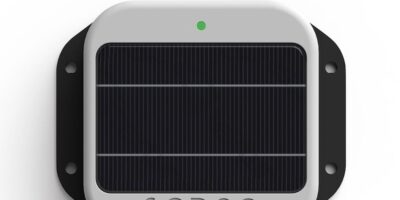Solar-powered cellular IoT asset tracker eliminates the battery
Eliminating the need for a battery replacement, SODAQ has used a Nordic Semiconductor multi-node NB-IoT/LTE-M nRF9160 system in package (SiP) in a solar-powered, perpetual operation cellular IoT asset tracker.
By completely eliminating the need for battery replacement, the tracker, developed by Dutch engineering and design specialist, SODAQ, is said to remove the single biggest cost factor in large-scale IoT tracking installations. Without needing replacement batteries it supports high volume, low cost cellular IoT tracking applications.
The miniature 80 x 80 x 11.5mm SODAQ Track Solar is part of the company’s Track asset tracking range. It joins two battery-powered variants targeting theft detection and parcel tracking and monitoring. The Track Solar weighs just 100g and is believed to be the first solar-power tracker available in the market. In low duty cycle applications comprising up to eight pings a day, SODAQ says the asset tracker will operate perpetually on harvested solar energy alone. The tracker is therefore suitable for a range of logistics, offshore, site management, and general asset tracking applications.
The tracker integrates a light sensor, accelerometer, temperature sensor and status LEDs, and is powered from a 0.5W solar panel. It also offers a positional accuracy of 5.0 to 20m for GPS, 10 to 50m for Wi-Fi, and over 100m for cellular use.
The cost of having to check and replace batteries in large IoT installations can quickly become the single biggest cost factor over an IoT product or sensor’s lifetime, said SODAQ’s CEO, Jan Willem Smeenk. He believes this cost factor will become even more significant as the data subscription costs for cellular continue to fall.
There is also an environmental impact to having billions of battery wasted a year. “To me, therefore, the future of IoT really does need to be batteryless and therefore self-powered wherever possible,” Smeenk said.
The Track Solar is able to operate without a battery by using the available hardware and software, and includes the low power characteristics of the Nordic nRF9160 SiP itself. Smeenk says it obeys the three golden rules of low power IoT design: Sleep as often as you can, work or go active for as short a period as possible, and communicate as briefly as possible when on-air.
Jan Willem Smeenk, was formerly a co-founder of on-line travel website, Booking.com.




